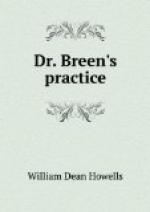“Why, have you been all this time looking for her?
“No, I couldn’t find her, and I’ve been reading. Barlow has just brought her in. He could find her. She fell out of a tree, and she’s frightfully bruised.”
She was making search on a closet shelf as she talked. When she reappeared with the bottle in her hand, her mother asked, “Is n’t it very hot and close?”
“Very,” said Grace.
“I should certainly think they would perish,” said Mrs. Breen, hazarding the pronoun, with a woman’s confidence that her interlocutor would apply it correctly.
When Grace had seen Bella properly bathed and brown-papered, and in the way to forgetfulness of her wounds in sleep, she came down to the piazza, and stood looking out to sea. The ladies appeared one by one over the edge of the cliff, and came up, languidly stringing their shawls after them, or clasping their novels to their bosoms.
“There isn’t a breath down there,” they said, one after another. The last one added, “Barlow says it’s the hottest day he’s ever seen here.”
In a minute Barlow himself appeared at the head of the steps with the ladies’ remaining wraps, and confirmed their report in person. “I tell you,” he said, wiping his forehead, “it’s a ripper.”
“It must be an awful day in town,” said one of the ladies, fanning herself with a newspaper.
“Is that to-day’s Advertiser, Mrs. Alger?” asked another.
“Oh, dear, no! yesterday’s. We sha’n’t have today’s till this afternoon. It shows what a new arrival you are, Mrs. Scott—your asking.”
“To be sure. But it’s such a comfort being where you can see the Advertiser the same morning. I always look at the Weather Report the first thing. I like to know what the weather is going to be.”
“You can’t at Jocelyn’s. You can only know what it’s been.”
“Well,” Barlow interposed, jealous for Jocelyn’s, “you can most al’ays tell by the look o’ things.”
“Yes,” said one of the ladies; “but I’d rather trust the Weather Report. It’s wonderful how it comes true. I don’t think there ’s anything that you miss more in Europe than our American Weather Report.”
“I’m sure you miss the oysters,” said another.
“Yes,” the first admitted, “you do miss the oysters. It was the last of the R months when we landed in New York; and do you know what we did the first thing—? We drove to Fulton Market, and had one of those Fulton Market broils! My husband said we should have had it if it had been July. He used to dream of the American oysters when we were in Europe. Gentlemen are so fond of them.”
Barlow, from scanning the heavens, turned round and faced the company, which had drooped in several attitudes of exhaustion on the benching of the piazza. “Well, I can most al’ays tell about Jocelyn’s as good as the Weather Report. I told Mrs. Maynard here this mornin’ that the fog was goin’ to burn off.”




